Remember why you entered a trade
We put plenty of effort into entering a trade, but what about the exit? 🚪

The market might be closed today, but it's a great time for a post on trading psychology. 🧠
Today's topic focuses on what to do after you've made a trade. We put lots of effort and thought into working with charts, reviewing data, and tracking trends before we make a trade, but do we do the same amount of work to determine what to do with an existing trade?
All investments come with significant risks, including the loss of all capital. Please do your own research before investing, and never risk more than you are willing to lose. I hold no certifications or registrations with any financial entity.
Buckle up! 💺
Life after the fill
It's a feeling that we traders know well. You've done your homework, you've pored over charts in different time frames, you've calculated the probability of profit, and your trade just filled. It appears on the screen and you get that lovely ding from your trading application. It's euphoric! 🎉
But then one of two things happen:
- The trade turns green and you have that moment where you think "I'm a genius!"
- The trade turns red and, as you begin to sweat, you think "What the heck did I just do?"
This still happens to me constantly. There are two good quotes from books that I remind myself about here. The first is from Tom Hougaard's Best Loser Wins:
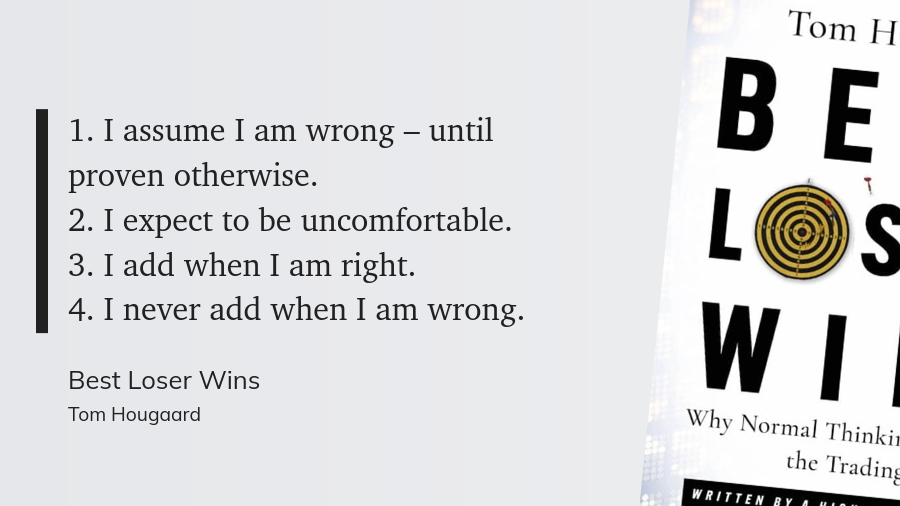
Tom explains this topic in much more detail in the book, but the main idea is that you should assume you're wrong and be uncomfortable about it every time. That helps to reduce the euphoria when a trade goes well and cushion the blow when a trade goes poorly. It's also easier to cut a losing trade (and definitely avoid adding to it) when you assumed it was going to lose when you put it on.
Mark Douglas wrote a book called Trading In The Zone that talks a lot about emotions, especially fear, and how they can cause problems with trading:
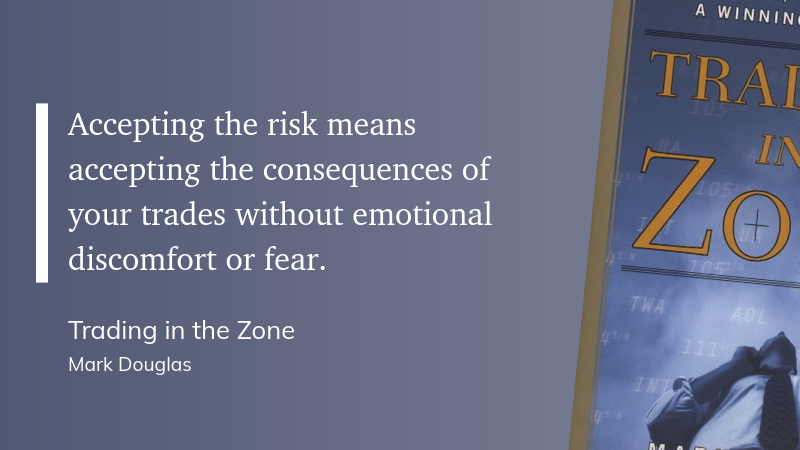
If you accepted the risk prior to the trade, but found the risk to be unacceptable later, then you were likely wrong at the beginning. Use that moment of realization as a learning opportunity.
I'm reading Jack Schwager's Market Wizards series now and I'm on the second book. One common thread among most of the traders is that they've blown up their personal accounts at least once. They've also made massive errors in their professional trading as well that led to significant losses. While all of them had an immediate emotional reaction just as anyone would, they immediately shifted their focus to all of the available options available to them to exit the trade on a better footing.
Sometimes these exits meant a slightly lower loss but sometimes they found ways to get a profit from it.
When your brain is in fight or flight mode, it focuses every bit of its thinking power in preserving life. Creative thinking goes right out the window. If you work diligently to remove emotions from your trading, your brain can focus on all of the creative options available to you for improving the trade's outcome.
Dealing with winning trades
Tom Hougaard's approach is to add to winning trades since the market is telling you that you made a good call on the trade. That doesn't mean you're a market wizard. It just means that the market was quietly offering a chance to make money and you jumped on the right train. 😉
There are two aspects of winning trades that really get me anxious:
- "Oh boy, I'm making money! I should take my profits now and go!"
- "Sure, this trade is green, but the move already started and went pretty far. It's too late to add to this position."
Taking profits too early
It's very easy to be tempted to take early profits. A market turn might cut your profits or send you into a loss. However, if you made the right call on the market move, and the market is telling you that you made the right call, don't hop off that train just yet.
It's a good idea to map out what you plan to do with profits prior to putting on the trade. This doesn't mean you need to set a specific target (Hougaard recommends against this), but you do need to know when it's time to head for the exits.
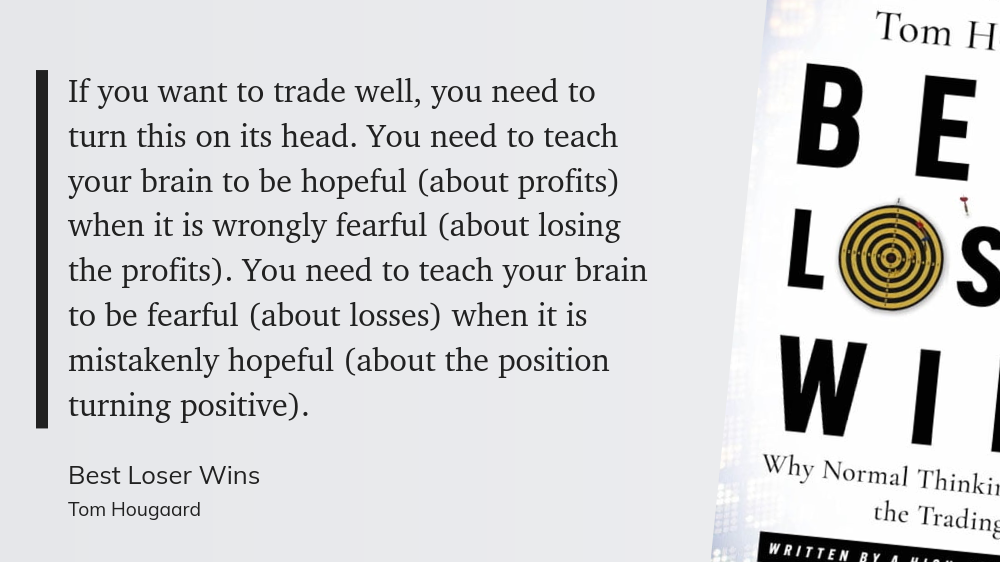
Short options trades are a little different since there's a defined end when the premium particular option runs down to zero. Long options and long stock can keep going forever.
I set a 50% profit trigger (good to close order) immediately after selling puts. This is something that I learned on the Theta Gang podcast and extensive backtesting from TastyTrade shows that the 50% profit trigger on short options increases the probability of profit while also reducing losses.
Too late to add
We made a good trade and the stock moved in our favor by a large amount. That's great! Now, let's add to that position!
If your response to that is "YOU'RE CRAZY!", you're in good company. 🫂
Again, Tom says it best:
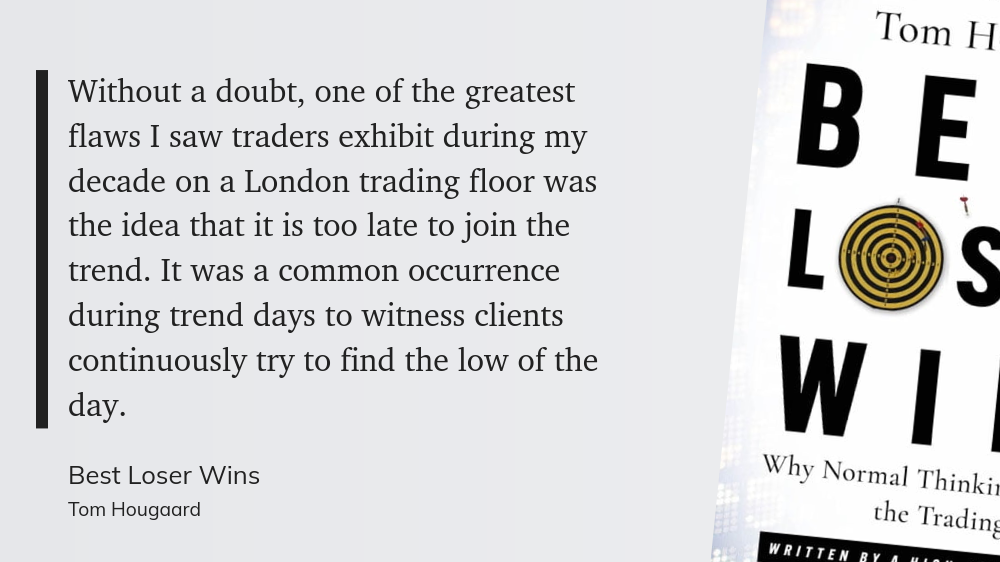
It's never too late to join a trend in the market, whether that's up or down. Since you're going into the trade assuming that you're wrong, you already know where you plan to exit the trade when it turns against you.
A great example is the recent run by SPY, the S&P 500 ETF. I've seen people calling for a crash in the market since early November, but it has been on a 25%+ run since those lows. I still see people saying each day that "it's gonna crash", but it just keeps going.

One question to ask yourself in these scenarios is: "Would I want to bet serious money against this rally right now?" If the answer is no, perhaps you should put on a trade that follows the trend. 😉
Dealing with losing trades
Going into the trade with the assumption that it will likely lose helps you deal with losses much more easily. Nobody likes to admit that they're wrong or they made a decision that lost money. I approach these situations as "I hopped on the wrong train and it's time to hop off."
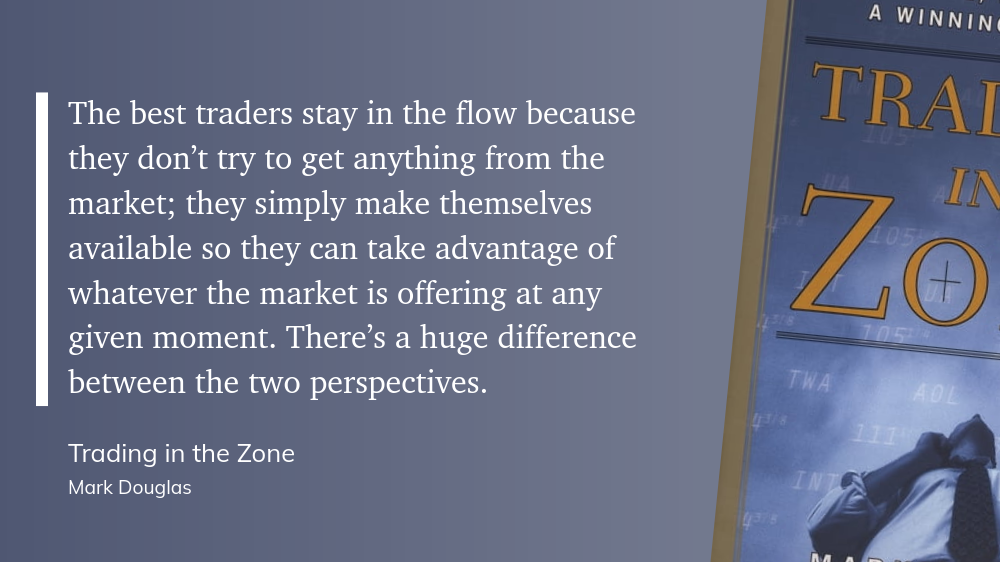
The market offers a nearly unlimited amount of paths to success or failure. These paths change substantially each day. Determining which ones are which is the real challenge. The right one today might not be the right one tomorrow.
Losing money on a trade doesn't mean that you're an idiot. It doesn't mean that your technical or fundamental analysis was wrong. It doesn't mean that you need to read more books or pay for someone to train you. It doesn't mean that you should subscribe to a service that helps you trade or gives you trades to make. It doesn't mean that you should quit trading.
A loss simply means that while you were standing in a massive train station full of people with confusing destinations, you hopped on the wrong one for a brief period of time. Get off that train and dust yourself off. Getting emotionally tied up in that decision will likely cause you to miss a train to success that sits nearby.
Emotions are difficult to control. If there's one thing I'd agree with completely from Schwager's interviews of successful traders, it's this one:
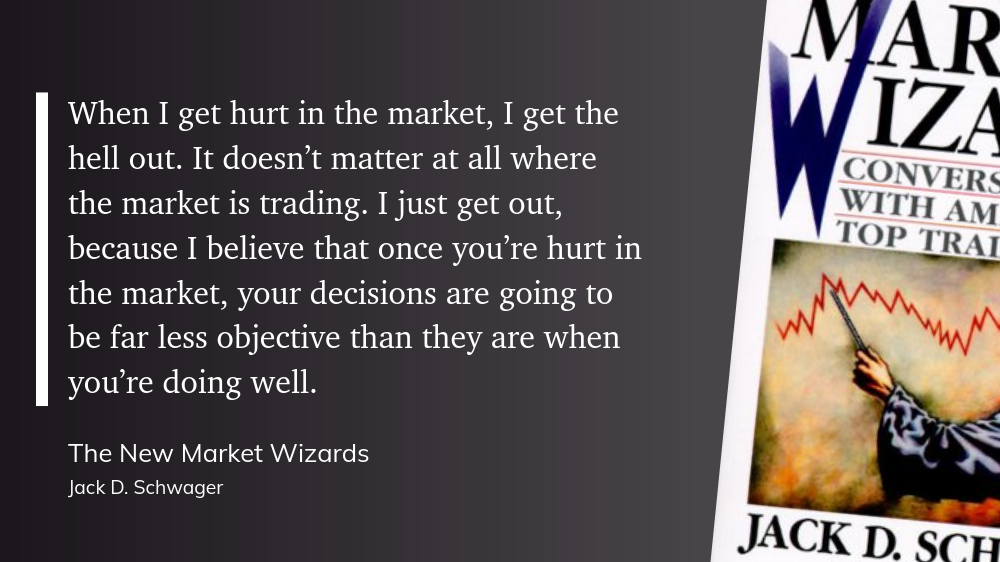
If you're upset because a trade went against you, or if you're not in the right frame of mind to be trading: DON'T. The moment you try to fight the market, it will win. One of my favorite market quotes is from Ed Seykota:
“Win or lose, everybody gets what they want out of the market. Some people seem to like to lose, so they win by losing money.” -- Ed Seykota
Read that quote a few times. It's deep.
Wrapping up
I could write ten pages on this topic, but it's probably a good time to close this up for today. The main things to remember are these:
- It's never too late to join a trend in the market.
- Always assume the trade will be a loser and plan accordingly.
- Be available for what the market is offering you and don't demand something from the market.
- Remove emotions from winners and losers.
My trading began in the summer of 2020 and I still make these mistakes constantly. It's still a work in progress.
I hope all of you have an awesome weekend. If you're celebrating holidays over this long weekend, then enjoy that extra time off! 🌴


Discussion